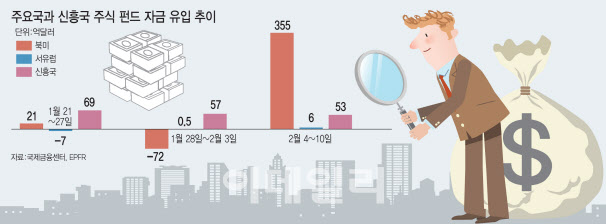|
Developed countries with high COVID-19 vaccine penetration rate↑
According to EPFR, an international financial center and data provider, equity funds in developed and emerging countries have flowed in for 7 weeks and 5 consecutive weeks, respectively, as of 10 days, and bond-type funds are showing an inflow trend for 14 and 19 consecutive weeks, respectively.
In particular, it was a stock-type fund in developed countries, with a total of 52.7 billion dollars inflow in last week (2-10 days). North American equity funds turned from a net outflow of $7.2 billion to a net inflow of $35.5 billion last week, while Western European equity funds showed a net inflow of $600 million in the fourth quarter of strong corporate earnings outside the UK. Love calls are continuing in bond-type funds. Bond funds in developed countries, such as North America ($5 billion) and Europe ($1.2 billion), have flowed in $39.7 billion in the last three weeks alone. After the realization of Blue Wave, the preference for risky assets continued, and as the US and UK showed high vaccination rates, expectations for an economic recovery were revived. The rise in US 10-year Treasury yields above 1% seems to have stimulated the sentiment of investors who prefer stable interest payments.
“This year will be a record recovery year from the severe economic downturn caused by Corona 19,” said Ken Feng, an investment strategist at Citi Private Bank Asia. “The stock market is slower than last year, but it will continue to perform well.” He added, “Investors who prefer bonds still have good returns.”
The flow of’Money Move’ will continue even in emerging countries
The market predicts that even in emerging countries, where the recovery of Corona 19 is slower than in advanced countries, the influx of funds remains due to factors such as the impact of the economic recovery in advanced countries and rising raw material prices. Variations by country exist, but in the mid to long term, the flow of money moves from developed countries to emerging countries is expected to continue. Thanks to these expectations, the Morgan Stanley Capital International (MSCI) Emerging Countries (EM) Index also recorded a record high of 1437.72 as of the 16th.
Blackrock, the world’s largest asset manager, is forecasting that the US stock market will continue for another six months, and maintains an Overweight opinion on Asian stock markets excluding Europe, emerging countries and Japan.
Black Rock’s strategist Sam Vecht said, “Since Corona 19, low interest rates and fiscal stimulus measures continue to increase liquidity. This is a positive factor for both investors and emerging economies,” he said. “It is necessary to diversify investment destinations while watching the economic improvement trend of emerging economies such as Indonesia, Turkey and Egypt as well as China.”
India’s economic daily Economic Times and France’s largest financial group BNP Paribas also said, “The appetite for risky assets spreads as the dollar weakens and the economy recovers due to additional stimulus measures in the US, and stocks and bonds in emerging economies will continue to buy for the time being” Expected.
In particular, the Indian stock market, which is showing a sharp rise thanks to the government’s massive economic stimulus measures, has flowed in $3.53 billion this year only through stock funds until the 10th. China’s stock market, which has expanded its margins with 18 million new individual investors, is also on the rise thanks to the strong performance of tech stocks.
Investment strategist Feng said, “In emerging markets, it is worth paying attention to the Latin American and Asian markets.” In particular, he stressed the need to pay attention to the bond market in Asia. Investment strategist Feng explained that US dollar-denominated high-risk bonds and emerging markets dollar-denominated bonds are expected to yield 4.9% annually, and US investment grade bonds are expected to yield 2.7%.
– .


